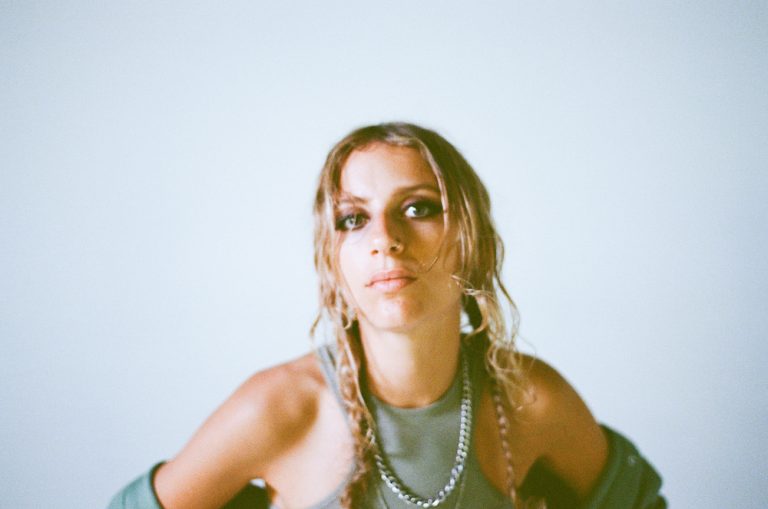Your quote about “PWR” in the press release mentions how it could have been melancholy, but it came out hopeful and sweet. Do you have any way of explaining how that happened?
I can’t tell you why. People say, like, ‘it’s not what happens to you, it’s the way that you deal with it’. On that track, it was something that happened to me, it could have been something that made me angry and sad, but I came out of it still feeling hopeful and good and positive. I remember writing and being like, ‘Whoa, what the fuck?!’ I literally wrote it in like, two, three hours and I got on the train and I listened to it on the way home, and I was like ‘holy fuck’ and I cried. It was inexplicable, maybe.
For the video for “PWR” you said kind of explained it to Nettie Hurley, the director, and she managed to translate it. Do you remember what you said to her?
She’s really cool, a little bit older and she just kind of got it; that kind of like sweet sensation of a memory that maybe didn’t go the way you wanted it to. It’s an innocent thing, and she totally related to it. This particular track represented exploring something that might be internally innocent, like a beautiful, romantic, idealistic thing with somebody that stays idealistic because you never saw it through.
“Blur” is the second track, and I am particularly interested in the line “I am a target I’m a weak and feeble thing,” where you sound genuinely weakened as you sing.
It was a very doomed time; I think it is a quite dark picture to paint. I think the track as a whole is quite consistent, so I think it emphasises itself in the weaker bits and the stronger bits. I’m talking about feeling powerless, and then coming alive. I guess if a song is good, or a song is true, it will represent that in the way that you feel and hear it. So if you’re feeling like I’m sounding weak when I’m saying that then that’s a good thing. I just I feel like I get into a groove, I get into a picture and then I just say it. And then we go back and refine it.
“One of Us” is the final track on PWR, and you’re singing about this kind of unbreakable connection between two people. I can’t decide if it’s a healthy thing or an unhealthy thing?
“One of Us” was one of the first tracks I wrote, and it’s about a gravitational pull, a mirroring, a repetitive sort of relationship. I don’t think it was a good or bad thing. I think it’s totally okay for someone to have power over you or you to have power over somebody, as long as you can admit it, and laugh about it.
That, to me, was quite an exciting track. I felt really liberated after I wrote it. I felt like I said something really honest and true in a way that I really enjoyed listening to.
And then on the next EP, Wavey, we start with the title track, and I guess the obvious question is why is it called “Wavey”?
For me, I like see the tracks – they have colours and shapes to me – and “Wavey” is like a pulse. It just so happened that it kind of also works analogy-wise. But for me, I kind of have to name a song in the first moment after I write it. So I called it “Wavey” and I thought I was gonna change, but I just kept it because it looked like the track in my head.
Is “Wavey” a sad song?
I don’t think it’s sad, I think it’s honest. I feel like having elements of yourself be out of your control can be quite seductive, which is maybe why it’s not sad. I always feel happy to explore that side of myself.
What was going on in your head when you wrote “ATV”?
It was written during lockdown. I felt like I was stuck in like a repetitive circley bubble of fuzz, and I was just kind of being visited by the same images. I felt that my head was just a receptor for some shit, and I was just doing the same thing every day for a minute.
There’s that line in it where you sing “Maybe I’m just noise in the back,” is that about feeling crowded out of your own mind by all the other things going on in the world?
When I wrote it I didn’t really think about what it meant, but now I can see it’s about sinking into the back, feeling irrelevant, feeling like people can’t hear you.
Wavey finishes with “Trip”, which is slightly older. It also has a very film noir feel to it.
When I wrote “Trip” I had a clear image in my head and it almost looked like a movie, so I just wrote to that. But then we ended up fucking with it, and I was like, ‘why don’t I do some whispers?’ and we just made that whole thing into a vibe. We just kept deliberately enhancing that vibe after I did the first couple of takes.
PWR and Wavey are both out now via Blue Flowers. You can follow Grand Pax on Facebook, Twitter and Instagram.

